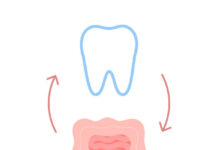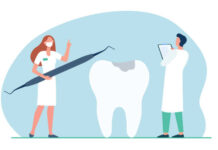What are dental hygienists?
A dental hygienist is a regulated medical professional specializing in oral care. In Ontario, most will have obtained formal schooling from a college like The College of Dental Hygienists of Ontario. Oral disease prevention is the primary focus of most dental hygienists.
What are the differences between a dentist and a dental hygienist?
Dental hygienists are quite similar to a dentist, but with some key differences. A dental hygienist is responsible for providing optimal hygiene and oral care. They usually treat minor oral health problems, like cavities and bad breath, whereas dentists and oral surgeons are tasked with rectifying major oral health issues, like an abscessed tooth.
A dentist is the only person allowed to provide an oral care diagnosis for patients and they run the dental office. They will be performing surgeries, grafts, tooth extractions and referring patients to other oral care specialists.
The hygienists will perform routine cleaning and maintenance work on your mouth, and they will be the main person you are liaising with at the dental office. They will advise their patients on the best care for their teeth and gums. They may apply treatments, such as sealing cracks in teeth. They often also provide fluoride treatments for teeth cleaning.
Some hygienists may receive additional training for orthodontic procedures, such as the placement of braces. Some dental hygienists may obtain a different certificate to place dental fillings and provide other therapeutic services for their patients.
Some work in hospitals or schools, while others may work in a private office or clinic. Some will work alongside an oral surgeon or dentist, while others prefer to work as independent dental experts.
The Benefits of Working With a Dental Hygienist
Your mouth will be examined for tooth decay, infections, and other anomalies. They are not only trained to help patients improve their overall oral health but can also help patients prevent many types of oral diseases, such as advanced gum disease.
The dental hygienist will also remove oral bacteria that cause halitosis so that your breath will be minty and fresh. Preventive care will also be provided.
They will also keep your medical information up-to-date. Taking care of your oral health is very important, so seeing your dental hygienist on a regular basis is vital to maintaining oral health.
You may suffer from cavities if you do not care for your teeth. Deep cavities can become very serious, making it hard to eat, talk, or breathe. Serious dental infections, such as abscesses, can also spread to the lungs and brain and cause death.
Poor oral health will lead to bad breath, receding gums, crowding, and the eventual loss of teeth. It can cost tens of thousands of dollars and years of dental treatments to fix the damages caused by prolonged poor oral health.
Scaling, polishing, and deep cleaning techniques will be applied to remove plaque, stains, and tartar that cause cavities, gum disease, and bad breath. In addition, they will teach you how to brush and floss properly.
What to Expect When Working With a Dental Hygienist
Dental hygienists may use hand-held mouth mirrors, metal curettes, and scalers while treating their patients. Tartar and plaque may be removed using these tools. Pneumatic turbines will vibrate to break down tartar for easier removal.
Once tartar and plaque have been removed, the hygienist may use a polisher to make your teeth look their whitest and healthiest. Your dental hygienist may also take X-rays of your mouth to screen for oral cancer and tooth decay that is invisible to the naked eye.
Syringes may also be used to numb the mouth if you have a low-pain threshold or simply want a more comfortable experience. As can be seen, a dental hygienist is a very skilled dental expert who can help improve the lives of their patients in significant ways.
Now, let’s focus on how you can find a good dental hygienist to take care of your oral health and the oral health of your loved ones.
What are the qualifications of a good dental hygienist?
Knowledge of anatomy and physiology is essential to becoming a good dental hygienist.
They need to know the intricacies of the human body and how anatomy is an intricate system of pathways, neurons, and circuits that work in synchronicity to function.
Furthermore, knowledge of dental materials and techniques is crucial. They need to know about the benefits and drawbacks of different dental materials to provide optimal care and reduce the risk of complications.
They need to know how to perform various techniques and procedures to help optimize their patients’ oral health and hygiene without causing harm. The skill, precision, and stamina needed to become a good dental hygienist are second to none.
Skill in performing preventive dental care is also paramount. Gums and teeth must be carefully examined for signs of decay, cancer, and other forms of oral disease.
Scalings and deep cleanings will eliminate plaque, tartar, and stains, reducing the risk of gingivitis or periodontitis. Fluoride treatments may also be administered to reduce the formation of cavities and improve halitosis.
Furthermore, skill in performing restorative dental care is also required to become a good dental hygienist. If you need dental casts, they may take impressions so they can be made.
The best hygienists will have received a specialty certificate that qualifies them to place fillings, similar to a conventional dentist. They will know how to use syringes to help sedate or numb patients before more serious procedures, such as a root canal or the extraction of wisdom teeth.
Tips for Maintaining Good Oral Hygiene
Teeth should be brushed at least twice daily with fluoride toothpaste. You should floss at least once a day, albeit twice is ideal. Food and beverages high in starch and sugar should be avoided, as they will adhere to your teeth and cause tooth decay.
Avoiding sugary and acidic drinks and drinking 6 to 8 glasses of water per day can help maintain good oral hygiene.
Closing Thoughts
If you suffer from bad breath, stains, gum disease, or cavities, a dental hygienist can help via dental fillings, fluoride treatments, deep cleanings, scalings, or polishing treatments.


























